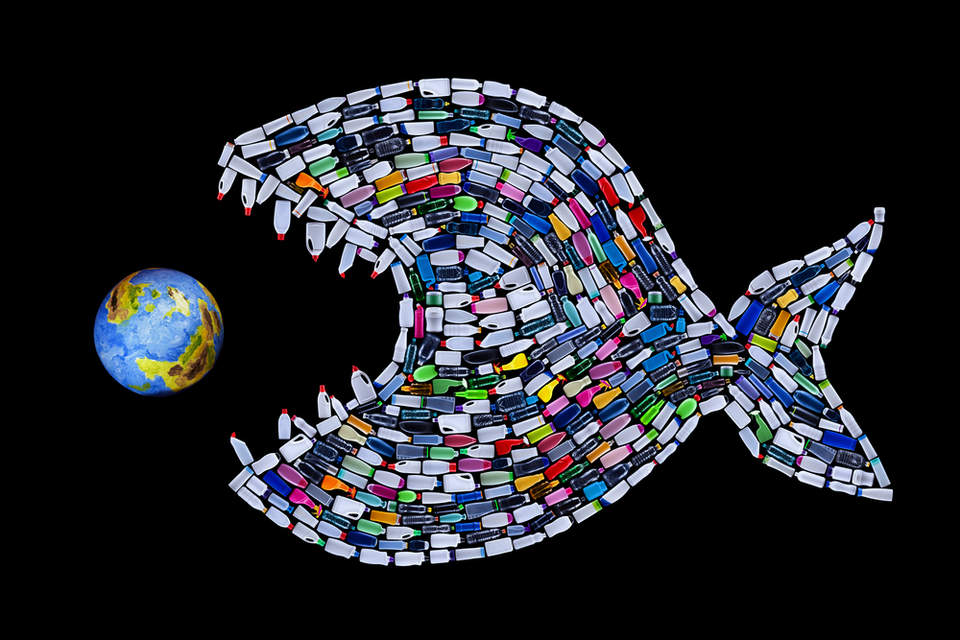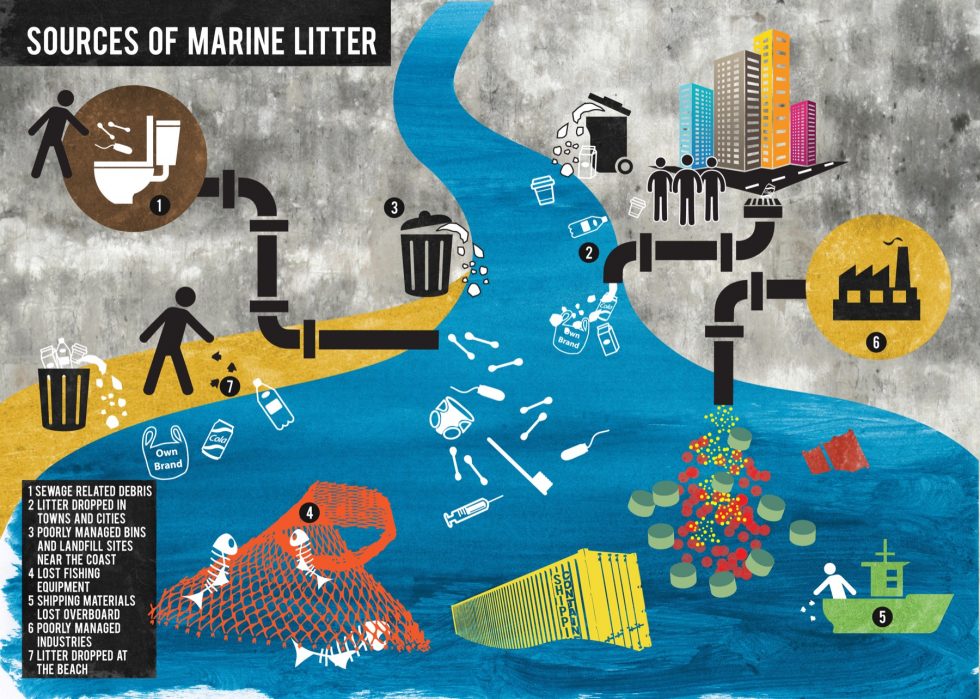We live in a plastic world. From pens to iPods, food packaging to microbeads in facial wash, plastic is everywhere.

Shutterstock / Nagy-Bagoly Arpad
Why Are Plastics Bad For The Environment?
Plastics are notoriously persistent pollutants. They don’t degrade easily, often taking decades if not hundreds of years to perish. Even then, plastics don’t decompose into the natural environment but break off into smaller and smaller pieces until they become invisible to the naked eye (known as ‘microplastics’). Plastic debris is present in all shapes, sizes and forms — from hard, intact plastics to formless bags and even tiny, microscopic plastic beads.
As plastics are made from fossil fuel products, they contain chemicals which can leach out and enter the surrounding environment. It’s surprising that plastics only became popular enough for common use in the 1930s, and yet today, over 4 to 5 trillion plastic bags are produced globally every year. Due to the non-decomposing nature of plastics, they tend to wind up in the environment, not just becoming an eye-sore but posing serious hazards to wildlife and even humans.
How Do Plastics Get Into The Environment?
Plastics from urban areas, usually end up in landfill sites but when irresponsibly disposed off, can get washed down into drains and rivers, winding up in the sea. Plastic litter in coastal areas such as beaches also get taken into the sea, especially after heavy storms and flooding. These plastics then get transported through oceanic currents to accumulate in certain areas of the ocean.
To make matters worse, a large proportion of plastics found in the ocean were disposed off at sea! Back in 1982, before the MARPOL¹ legislation were in place to prevent waste disposal at sea, a whopping 639 000 plastic containers were dumped daily into the sea by merchant ships worldwide. Although such dumping is illegal now, industrial fishing gear like nets and lines as well as litter from industrial and cruise ships continue to enter the marine environment. The ocean has unfortunately become the ultimate landfill for plastic waste, posing severe threats to marine life.

Image by Surfers Against Sewage
How Do Plastics Affect Wildlife?
More than 200 species have been found entangled in plastics with larger species more visibly affected through strangulation, drowning, lacerations, ingestion, intestinal obstruction, starvation from loss of appetite and death. All seven species of sea turtles, six of which are endangered, have been recorded to suffer from plastic encounters. One study showed that Northern fulmars have been recorded to redistribute over 6 tonnes of plastic through ingestion. It’s not just the bigger chunks of plastics that can be harmful to wildlife. Studies show that microscopic fragments ingested by invertebrates like oysters can cause reproductive problems too.

Photograph by Chris Jordan
How Do Plastics Affect Habitats?
Impacts of plastics on wildlife are far better recorded in marine environments than on land, possibly due to the higher visibility of impacts. Apart from the physical pollution in the ocean, abandoned fishing gear have been known to snag and break off coral reefs. Intact, hard plastics can obstruct pathways and act as hard surfaces for bottom-dwelling species, potentially altering their habitat. Furthermore, the toxic chemicals in plastics have been linked with cancer, suggesting that the mere presence of plastics in natural environments can be hazardous to wildlife.
Can Plastics Enter The Food Chains?
Recent studies have shown that microplastics in shellfish like mussels and barnacles, can remain within the system for days, increasing the risk of plastics being carried into the food chain. Another study confirmed that microplastics in farm soil has indeed travelled up the food chain into earthworms, chickens and possibly even humans, through ingestion.
What Can We Do To Stop Plastic Pollution?
It could be argued that the level of plastic pollution faced in the world today, is because of the ”throw-away” attitude adopted by humans over the recent years. Plastics were invented to be reusable, long-lasting materials, which is evident in their durability. However, the ”single-use culture” has led to cheap, disposable plastics that end up choking our seas.
As consumers, we can support sustainable products, driving the market towards a plastic-free world. Companies and manufacturers aim to please their consumers, hence, consumers hold the power to drive changes in the industry. By being aware of ingredients in the products used and supporting manufacturers or products that are environment-friendly, we can make a great deal of difference collectively. The recent ban on microbeads is a great example of how consumer power can be used to help protect the environment!
As citizens, supporting local and national government efforts to reduce plastic usage, improve recycling standards and promote more eco-friendly options are vital to ensure such green actions continue. By showing interest in environmental efforts, either by voicing out suggestions or providing feedback to local councils, decision-makers can be motivate to further pursue actions that help protect the environment. After all, local governments exist to improve our quality of life as citizens. Other community efforts such as large-scale clean-up events or local ‘plastic-free’ campaigns can help raise awareness whilst getting more people involved.
As individuals, making changes, even small ones, to live more sustainably on a daily basis can amount to a cumulatively large difference. For instance, taking a reusable coffee cup to work or carrying your own canvas bag to the supermarket can prevent the use and disposal of unnecessary plastics. Since the UK government imposed the 5p charge on plastic carrier bags in October 2016, over 9 billion less plastic bags have been used. That’s 9 billion less plastic bags potentially entering the ocean. By consciously adapting our behaviour to make plastic-free choices, we can live more sustainable and environment-friendly lives, enabling us to live in better harmony with the environment.
Is It Too Late To Make A Change?
It’s never too late to make a change. Change doesn’t happen overnight and it needs to start somewhere. No matter how small the effort, if we work together, we can make a huge difference. The #OneLess campaign emphasizes just that. One less plastic bottle, fork or bag goes a long way. We need each and every individual to help protect our environment. Join our fight against plastics now.
Support the #OneLess campaign and help reduce plastic waste.
¹ MARPOL is short for International Convention for the Prevention of Pollution from Ships established in 1973 by the International Marine Organization (IMO). This is the main international convention preventing marine pollution and regulating waste management at sea.